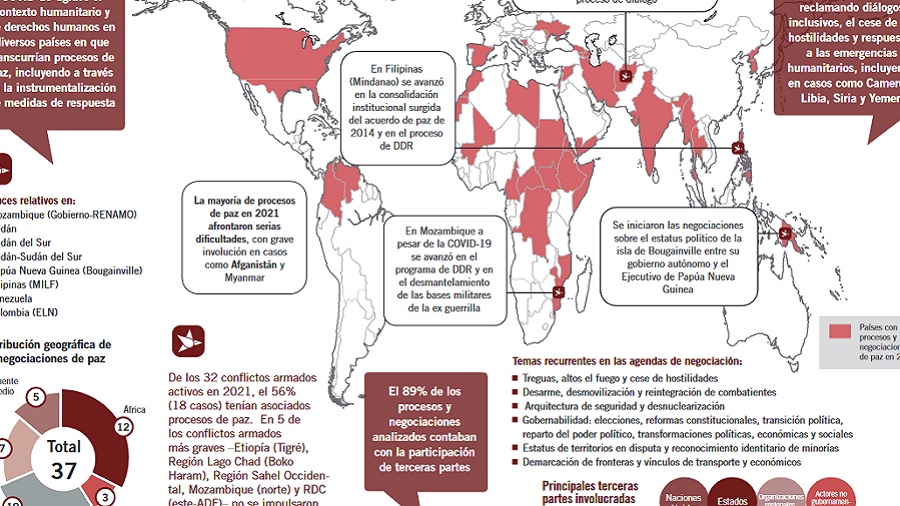Over half of armed conflicts in 2021 took place during peace talks
The School for a Culture of Peace (ECP) at the UAB recently published its Peace Talks in Focus. Report on Trends and Scenarios, a yearbook analysing peace processes and negotiations taking place in the world during one year. The analysis includes reflections on the fact that the majority of armed conflicts occurred while peace talks were also underway. In 2021, 37 peace talks and processes were counted, and 56% of them under situations of armed conflict.

The study of this year's conflicts, conducted by the School for a Culture of Peace (ECP), comes to the conclusion that most of the active armed conflicts occuring in 2021 underwent great difficulties, and it highlights huge setbacks suffered particularly in Afganistan - with the Talibans taking over - and Myanmar - with a coup d'etat in February. A total of 37 peace talks and processes took place in 2021 (by continents: 12 in Africa, 10 in Asia, 7 in Europe, 5 in the Middle East and 3 in North and South America. Of these 37 peace processes, 18 are associated with active armed conflicts. At the same time, 14 armed conflicts with no peace talks in sight also took place around the world.
Among the processes undergoing difficulties in 2021 are the cases of the Philippines (National Democratic Front of the Philippines), Yemen, Syria, Palestine, Somalia, Libya, Mali or, in the European continent, Georgia-Russia, Armenia-Azerbaijan, and the case of Ukraine, which in 2022 obviously worsened with the current rise in military escalation. Conflicts that were stagnant during a greater part of 2021 were Eritrea-Ethiopia, Morocco-Western Sahara, North Korea-South Korea, North Korean-United States, Nagaland (India), Cyprus, Moldova (Transnistria) and Israel-Palestine. In contrast, there were relative advances made in Mozambique, Sudan-South Sudan, Papua New Guinea (Bouganville), the Philippines (Bangsamoro), Venezuela (negotiations in Mexico between government and opposition), Colombia (NLA) and the Basque Country, which the report highlights as having "witnessed progress, including in the area of co-existence and in transferring ETA prisoners, in the year that marked the 10th anniversary of the definitive cessation of ETA’s armed activity".
The yearbook points out two aspects of the processes and talks taking place in 2021. On the one hand, the participation of external stakeholders in the majority of peace processes: 33 of 37 talks included the participation of governments from third countries, international organisations (United Nations, European Union, African Union, the OSCE, etc.), local governmental or civil society agents, religious organisations, etc. On the other hand, the persistent difficulties encountered by women to participate in talks and include the perspective of gender into the peacebuilding designs, agendas or accords, despite some limited attempts observed in conflicts concerning Mali, the Philippines and Colombia. However, the ECP does highlight that women-led movements and organisations were key actors in motivating civil society to participate in peacebuilding processes.
Finally, it must be mentioned that as seen in 2020, the COVID-19 pandemic continued to worsen the humanitarian conditions and human rights of people in several countries in which peace processes were taking place. In some contexts, the response measures to the pandemic implied a continuity in policies which did not guarantee the security of citizens. In some cases in Africa, for example, the governments declared states of alarm and states of exception as a way to remain in power, thereby hindering any advances in the peacebuilding initiatives and peace talks.
The UAB, with Sustainable Development Goals
Peace, justice and strong institutions